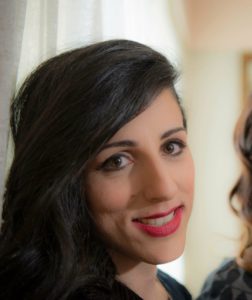 Despina joins Western University’s School of Kinesiology all the way from Cyprus and she is now in her fourth year of her PhD. She came to Canada in 2014 with her first stop at Brock University. As a visiting student at Brock she got firsthand experience with research and was encouraged to pursue her doctorate degree here in Canada. She gives credit to her current supervisor who she says gave her the confidence to pursue a four year degree away from home. In fact, she says one of the main reasons she even felt confident in making the decision to pursue her education at Western was because of her supervisor, “I chose my supervisor because he understood that I come from a different culture, for me leaving my family and moving to a new country is hard and very huge and he helped me a lot to progressively adjust.” She also added that the graduate office is very helpful because they understand how hard it is to be far away from your family and your country, “If I have a hard time with something they will listen and they will help me find a solution.”
Despina joins Western University’s School of Kinesiology all the way from Cyprus and she is now in her fourth year of her PhD. She came to Canada in 2014 with her first stop at Brock University. As a visiting student at Brock she got firsthand experience with research and was encouraged to pursue her doctorate degree here in Canada. She gives credit to her current supervisor who she says gave her the confidence to pursue a four year degree away from home. In fact, she says one of the main reasons she even felt confident in making the decision to pursue her education at Western was because of her supervisor, “I chose my supervisor because he understood that I come from a different culture, for me leaving my family and moving to a new country is hard and very huge and he helped me a lot to progressively adjust.” She also added that the graduate office is very helpful because they understand how hard it is to be far away from your family and your country, “If I have a hard time with something they will listen and they will help me find a solution.”
When asked what she found challenging she said, the winter! The cold weather may come as a shock to many International students who are not used to the same temperatures in their home country. She also said that language was a challenge. Specifically she shared that often times when International students learn English, they learn the proper grammar, scientific terminology and writing skills however what they may lack in the ability to confidently engage in day to day conversation (and it gets even harder when you add in some English slang). She recommends that a way to overcome this challenge is to put yourself out there and interact with local students. This may be through lab socials, events hosted by the Society of Graduate Students or opportunities through conversation circles organized through The Global Café. Another resource she recommends is attending workshops hosted by the Teaching Support Centre. By attending these workshops she said that you meet other students who are also trying to navigate the language barrier and that can be comforting. Additionally you will learn about many topics such as navigating supervisor and lab mate relationships, teaching in an English classroom and conversation skills. She adds that doing a PhD can be lonely, so trying to build connections with other students will help you progress through your degree.
When asked how she defines success in grad school, Despina said, “Every time you fail you try to find a way to keep going, and that is success. Every failure and challenge that you face you find a way to keep moving and keep motivated.” And the university can support their International students with that motivation by offering equal opportunities to both International and non-International students. She highlights how important it is to allow International students to apply for funding opportunities because they too have research ambitions that should be considered in scholarship competitions.
Despina says that it is a life decision and an incredible journey to pursue an International degree. She says that “Deciding to move is a big decision but you should not be afraid to do it!” We learn from Despina that we are ‘Not All the Same’ and that’s what makes our graduate student population that much more impressive. We all have so many different experiences and ideas that we bring to the Western community, and this should be equally celebrated!